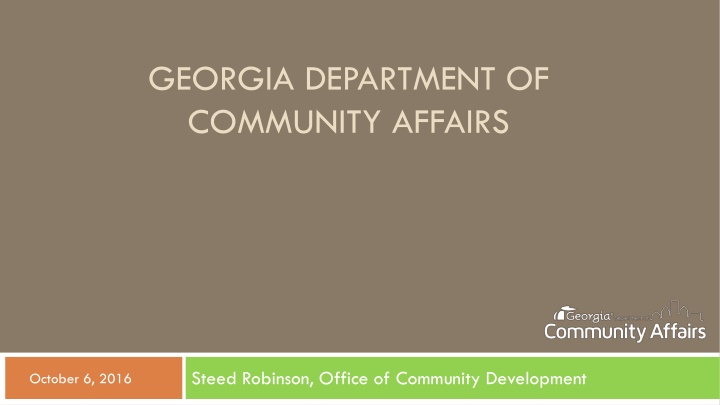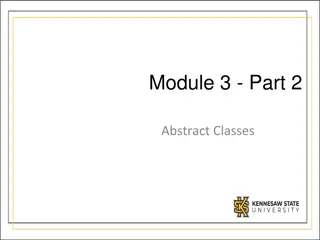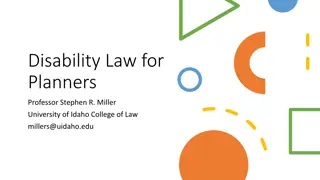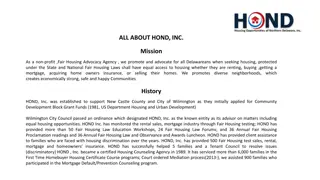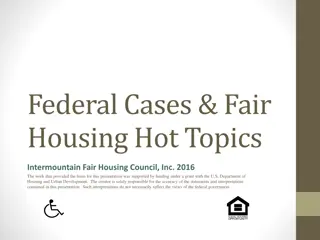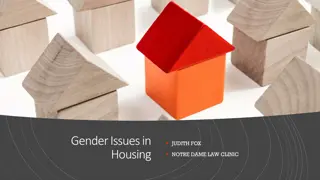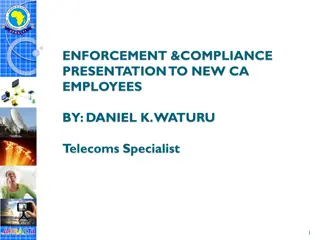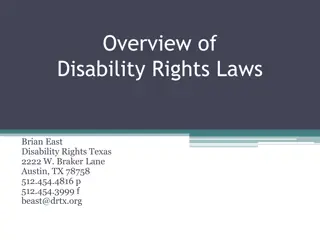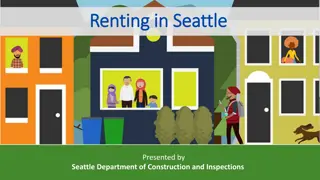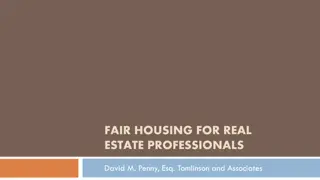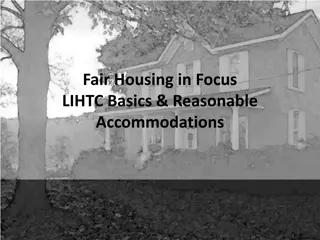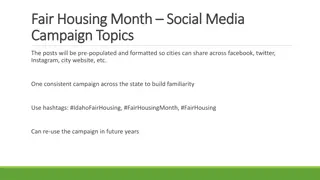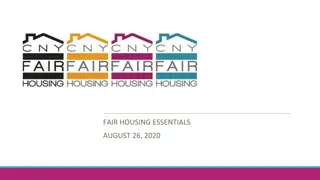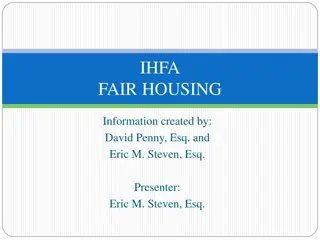Ensuring Fair Housing: Laws, Enforcement, and Protected Classes in Georgia
Fair housing laws aim to provide equal opportunity and non-discriminatory treatment to individuals within protected classes in Georgia. The state enforces substantially similar laws to federal statutes, recognizing seven protected classes. Discriminatory conduct triggers such as overt discrimination, disparate treatment, and disparate impact are addressed to promote fair housing practices.
Download Presentation

Please find below an Image/Link to download the presentation.
The content on the website is provided AS IS for your information and personal use only. It may not be sold, licensed, or shared on other websites without obtaining consent from the author.If you encounter any issues during the download, it is possible that the publisher has removed the file from their server.
You are allowed to download the files provided on this website for personal or commercial use, subject to the condition that they are used lawfully. All files are the property of their respective owners.
The content on the website is provided AS IS for your information and personal use only. It may not be sold, licensed, or shared on other websites without obtaining consent from the author.
E N D
Presentation Transcript
GEORGIA DEPARTMENT OF COMMUNITY AFFAIRS Steed Robinson, Office of Community Development October 6, 2016
FAIR HOUSING "It is the policy of the United States to provide, within Constitutional limitations, for fair housing throughout the United States." United States constitution 42 U.S.C. 3601
Civil Rights Statutes The Fair Housing Act or Title VIII of the Civil Rights Act of 1968, as amended by the Fair Housing Amendments Act of 1988 Title VI of the Civil Rights Act of 1964 Section 504 of the Rehabilitation Act of 1973 Section 109 of Title I of the Housing and Community Development Act of 1974 Title II of the Americans with Disabilities Act of 1990
What is Fair Housing and Equal Opportunity? 1. Ensuring non-discriminatory treatment of individuals within the protected classes. 2. Providing equal access to all programs, services and activities that receive any federal funds. 3. Affirmatively Furthering Fair Housing.
There are SEVEN Protected Classes under the FHA: Race: Black v White, Asian/Pacific Islander or American Indian/Alaskan Native Light v Dark skinned persons Inclusion in a specific religious group Hispanic Male or female Presence of children under the age of 18 or pregnant women Has a physical or mental illness that substantially limits one or more major life activities; Has a record of such a disability OR Is regarded as having such a disability Color: Religion: National Origin: Sex: Familial Status: Disability:
Georgias FH Laws and Enforcement Georgia has SUBSTANTIALLY SIMILAR Fair Housing Laws Georgia only recognizes the seven protected classes in the Federal Statute Georgia Commission on Equal Opportunity is local enforcement entity
Triggers of Discriminatory Conduct Overt Discrimination - Discrimination that is intentionally and blatantly inflicted on a protected class. Disparate Treatment - occurs when a protected class is treated in a less favorable manner Disparate Impact - equally applied treatment that appears neutral but has a harsher effect on a protected class (unintentional) Failure to Provide Reasonable Accommodations (most common discriminatory conduct) Failure to Allow Reasonable Modifications
WHAT IS DISCRIMINATION UNDER THE FAIR HOUSING ACT? Any difference in: TREATMENT EXCLUSION FROM or FAILURE TO OFFER or MAKE AVAILABLE TO A PERSON an equal opportunity to participate in, benefit from or use a service, program or activity because of RACE, COLOR, RELIGION, NATIONAL ORIGIN, SEX, FAMILIAL STATUS or DISABILITY.
What is Discrimination under the FHA? Protected Person/Group + Covered Dwelling/Activity + Prohibited Practice = Discrimination
COVERED ACTIVITIES include any activity receiving federal funds: Infrastructure improvements Public Facilities Neighborhood Revitalization Economic Development Sales Lending Insurance Rental Down-Payment Assistance All Areas Connected With Residential Housing Municipal Services Section 8 Rental Assistance
Covered Individuals/Entities Insurers Owners Developers/Builders Managers Homeowner s Associations Architects Contractors Lenders Engineers Real Estate Agents Brokers Landscape Architects All Persons/Entities Involved with Residential Housing Local Governments
Covered Dwellings Private and Subsidized Property/ies Examples: Single Family Dwellings Duplexes Multi-Family Buildings Migrant Housing Temporary Shelters Group Homes Assisted Living Housing Other Residential Housing Vacant Land offered for sale or lease for the construction or location of a residence
Prohibited Practices Any practice that affects a person s right to choose: Refusal to sell/rent after making a bona fide offer based to one or more of the protected classes, otherwise make unavailable or deny (42 U.S.C. 3604(a)) Discrimination in the terms, conditions or privileges of sale or rental of a dwelling (42 U.S.C. 3604(b)) Make, print or publish a notice or statement that indicates a discriminatory preference (42 U.S.C. 3604(c)) Falsely tell someone a dwelling is not for sale or rent based upon membership in one of the protected classes (42 U.S.C. 3604(d)) Steering people toward or away from particular neighborhoods based upon a protected class, Redlining, Reverse Redlining Blockbusting (42 U.S.C. 3604 (e)) Discrimination in residential real estate transactions Discrimination in provision of brokerage services NIMBYism (in certain circumstances) Coercion, Intimidation, Threats or Interference with anyone asserting a Fair Housing right or assisting others who are exercising that right.
Affirmatively Furthering Fair Housing (AFFH) Local governments and States that receive Community Development Block Grants (CDBG) as well as public housing agencies (PHAs) are required to affirmatively further the purposes of the Fair Housing Act. Which are: 1. Elimination of discriminatory conduct; and 2. Creating Inclusive Communities of Opportunities
Although all recipients of federal funds are required to certify that they are meeting their obligation to AFFH: This certification has rarely risen above mere boilerplate. Building on recent litigation and a new AFFH rule seeking to improve procedural compliance, HUD proposes an expanded enforcement focus and accountability of recipients to identify their compliance through concrete, quantitative benchmarks. AFFH applies to all housing and housing related activities in a jurisdiction whether publicly or privately funded.
RECIPIENTS MUST CERTIFY THAT THEY ARE AFFH Certification means three things: 1. Conduct an Analysis of Impediments to Fair Housing Choice(AI) study 2. Take measurable actions on impediments, if impediments are found 3. Maintain records of such actions
Definition of Impediments to Fair Housing Choice: Actions, omissions, or decisions which restrict housing choice because of protected class status
The AI must review the following: Demographic data regarding the jurisdiction s population and housing activities and programs Availability of housing stock for residents with disabilities Findings resulting from complaints and fair housing litigation in the jurisdiction Efforts to assist and serve persons with limited proficiency in the English language (LEP populations)
Develop a plan of action with a defined fair housing objective that specifies: What Actions Will Be Taken To Overcome The Impediments Identified; What Resources Are Available To Undertake Each Activity; Who Will Undertake Each Activity; And The Timeframe For Each Action.
Common Impediments to Fair Housing Discrimination against families with children; Discrimination against persons with disabilities; Insufficient multi-lingual marketing efforts targeted to those with limited English proficiency; Zoning and land use policies that permit only middle income to high income housing development; Geographic concentration of racial and ethnic minorities; Geographic concentration of low- and very low-income persons;
Appropriate Actions Select sites (or provide an incentive for developers to select sites) for affordable housing that increase opportunities outside existing areas of minority and ethnic concentration; Use federal funds for affordable housing to increase the supply of accessible units and large rental units for families with children; Adopt design standards that embrace the principles of universal design and accessibility.
The New AFFH Rule HUD announced the final rule on July 8, 2015 The new rule replaces the AI with the Assessment of Fair Housing (AFH) HUD proposes a streamlined process HUD will provide program participants with guidance, data, and an assessment template (AFH) Should help communities establish their own goals and priorities to address Fair Housing barriers in their communities.
The New AFFH Rule Designed to be more integrated in the Consolidated Planning Process, PHA Plans, and Capital Fund Plans Must be submitted to HUD 270 days before the start of the planning year HUD will not accept the Consolidated Plan without an acceptable AFH which impacts release of federal funds to recipients.
The New AFFH Rule What does that mean for the current AI? For the time being, grantees continue to submit AIs The new requirement will take effect for consolidated plans beginning in 2017 with a phased in approach
AFFH Activities include: Conducting fair housing planning Post Fair Housing posters/flyers in public places Pass resolution supporting Fair Housing Discuss Fair Housing at Public Hearings Conduct a Public Information Campaign on Fair Housing Advertising the availability of housing directly to populations less likely to apply Outreach to advocacy groups Train elected officials and staff on Fair Housing Laws and the complaint process
AFFH Activities include: Identify/enlist organizations that provide housing services (housing counseling agencies, etc.) Offer referral services to fair housing advocacy groups that conduct ordinance, regulatory and/or restrictive covenant reviews Educate code enforcement staff on accessibility requirements for newly constructed facilities Conduct/sponsor Fair Housing Seminars or other Housing Fair type activities Assuring that local governments comply with certifications.
DOCUMENT, DOCUMENT, DOCUMENT ALWAYS MAINTAIN A RECORD OF FAIR HOUSING ACTIVITIES AND COSTS ASSOCIATED WITH THOSE ACTIVITIES. Best practices require that a certain sum $$ of federal funds received is designated for Fair Housing Activities.
24 CFR 570.506(g): Fair Housing and equal opportunity records. Each recipient shall establish and maintain records that include: Documentation of analysis of impediments and actions carried out Data on participation in CDBG funded programs or activities, by racial and ethnic group, and single head of households Data on employment in each of the recipients operating units funded in whole or in part with CDBG funds Race and ethnicity data of households displaced as a result of CDBG-funded activities Documentation of actions undertaken to meet the requirements of the Section 3 program Race/ethnicity data for each business receiving a contract or subcontract of $25,000 or more from CDBG funds, including documentation of affirmative steps to promote minority business and women s business enterprise Documentation of affirmative action measures taken to overcome prior discrimination Documentation of Limited English Proficiency efforts
Thoughts Comments Questions
CONTACT INFORMATION Ms. Antonette Sewell, Esq. Director of Legal Services Georgia Department of Community Affairs 404-679-5291 Antonette.Sewell@dca.ga.gov
